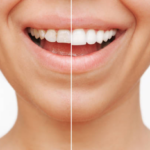
Dental implants have emerged as a groundbreaking solution when it comes to restoring a beautiful and functional smile. They provide a long-lasting alternative for replacing missing teeth and offer numerous benefits.
But exactly how long do dental implants last?
In this comprehensive guide, we will delve into the lifespan of dental implants, the factors influencing their longevity, and why they are superior to other dental prosthetics.
What is a Dental Implant?
A dental implant is a small titanium post that replaces the root of a missing tooth. It is surgically implanted into the jawbone, providing a sturdy foundation for a dental crown, bridge, or denture.
Dental implants are designed to mimic the natural tooth structure in functionality and aesthetics.
Why is it Important?
The significance of dental implants cannot be overstated. They offer a range of advantages that contribute to improved oral health, self-confidence, and overall well-being.
Dental implants offer numerous benefits, such as restoring a natural appearance, enhancing oral function, improving speech, preserving facial structure, and ensuring long-term durability. Unlike traditional dentures or bridges, dental implants are securely anchored into the jawbone, providing stability and preventing bone loss. They allow individuals to regain their confidence, enjoy a wide range of foods, and maintain proper oral health.
The Advantages of Dental Implants
Enhanced Appearance
Dental implants closely mimic real teeth, resulting in a natural-looking smile that increases your self-esteem.
Improved Functionality
Dental implants, as opposed to removable dentures, allow you to bite, eat, and speak naturally without discomfort or the danger of them slipping or falling out.
Longevity and Durability
Dental implants can last a lifetime with proper care and maintenance, making them a cost-effective investment in your long-term oral health.
Preservation of Bone Health
Dental implants stimulate the jawbone, preventing bone loss and preserving the natural contours of your face.
Dental Implant Procedure
Gaining an understanding of the typical steps involved in the dental implant process can help you prepare for the procedure and gain a better idea of what to expect.
Removal of Damaged Tooth
In order to make room for the dental implant, a damaged tooth at the implant site may need to be extracted.
Jawbone Preparation
In certain cases, a jawbone grafting procedure may be necessary to ensure there is enough healthy bone to support the implant. This procedure involves the transplant of bone tissue to strengthen the jawbone and establish a stable foundation for the implant.
Placement of Dental Implant
Once the jawbone is prepared, the dental implant is surgically placed into the bone. Over time, the implant undergoes osseointegration, which fuses with the surrounding bone, providing a sturdy and long-lasting anchor for the replacement tooth.
Bone Growth and Healing
After the implant is placed, the bone requires time to heal and bond with the implant. This process, known as bone growth and healing, typically takes a few months.
Abutment Placement
Following integration with the jawbone, an abutment is attached to the implant. This abutment connects the implant and the artificial tooth that will be placed on top.
Placement of Artificial Tooth
The next stage is to attach a tailored prosthetic tooth to the abutment, such as a crown, bridge, or denture. This tooth has been painstakingly developed to match your actual teeth’ color, shape, and size, resulting in a seamless and natural-looking grin.
What Affects the Lifespan of Dental Implants?
A variety of factors can have an impact on the lifetime of dental implants. Understanding these features allows you to take the necessary steps to extend the life of your implants.
Oral Health
Good oral hygiene is essential for the lifespan of dental implants. Brushing your teeth twice a day, flossing every day, and visiting Cimarron Family Dentistry for regular dental check-ups and cleanings will help prevent gum disease and preserve the health of your implants.
Lifestyle Choices
Certain lifestyle decisions can have an impact on the lifespan of dental implants. Avoiding smoking and restricting alcohol use can greatly boost your implants’ success rate and longevity.
Furthermore, eating a well-balanced diet and practicing excellent general health habits will help your implants last longer.
Injury or Damage
While dental implants are supposed to be long-lasting, they can be damaged by trauma or extreme force. Wearing a mouthguard during vigorous activities or sports can help avoid potential damage to your dental implants.
Medical Conditions
Specific medical conditions, such as uncontrolled diabetes or autoimmune disorders, can affect the success and lifespan of dental implants.
Discussing your medical history with your dentist to ensure the best possible outcome for your implant procedure is important.
Understanding the Costs of Dental Implants
While dental implants provide long-term benefits, related expenditures must be considered. The overall cost of dental implants might vary based on a variety of variables, including the number of implants necessary, any extra operations required, and geographic location.
Insurance and Payment Plans
While dental implant procedures may not be fully covered by insurance, some plans offer partial coverage. It’s recommended that you consult with your dental insurance provider to determine your coverage.
Additionally, dental practices like Cimarron Family Dentistry often provide flexible payment plans and financing options to help make dental implants more affordable for patients.
Maintenance of Dental Implants
Proper care and maintenance are vital for ensuring the longevity of dental implants. Incorporate the following practices into your oral hygiene routine:
Daily Cleaning
Brush your teeth twice a day using a soft-bristled toothbrush and fluoride toothpaste. Floss daily to clean the areas between your teeth and around the implant. Consider using an interdental brush or water flosser for added cleaning.
Regular Dental Check-ups and Cleaning
Schedule regular dental check-ups and professional cleanings to monitor the health of your dental implants. These routine visits allow your dentist to detect any potential issues early on and provide necessary treatments to maintain the longevity of your implants.
How Long Do Dental Implants Last Compared to Other Dental Prosthetics?
Dental implants surpass other dental prosthetics in terms of lifespan and functionality. Let’s compare dental implants to common alternatives:
Dental Bridges
Traditional dental bridges typically last around 10–15 years. However, dental implants with proper care can last significantly longer—often a lifetime. Additionally, dental implants do not rely on adjacent teeth for support, preserving the integrity of the surrounding natural teeth.
Dentures
Conventional removable dentures may need to be replaced every 5-8 years due to wear and changes in the mouth’s structure. In contrast, implant-supported dentures offer greater stability and durability, lasting 10–15 years or more.
Veneers
Dental veneers are thin shells placed on the front surface of teeth to enhance their appearance. While veneers can last 10–15 years with proper care, they are not a solution for replacing missing teeth like dental implants.
Dental Implants
Dental implants are the most long-lasting tooth replacement option available. With proper oral hygiene and regular dental care, dental implants can last 25 years or more. Investing in dental implants provides a durable and permanent solution to restore your smile and oral function.
The Global Perspective on Dental Implants
Dental implants have gained popularity worldwide due to their ability to restore oral health and improve quality of life. In various countries, dental implant procedures have become routine, with advancements in technology and techniques making them more accessible and affordable.
Patients from different cultural backgrounds and demographics are increasingly opting for dental implants to address tooth loss and enjoy the benefits they offer, such as enhanced aesthetics, improved oral function, and long-term durability.
Reasons Why You Need an Implant
Consider dental implants as a solution for missing teeth for various reasons. Cavities, tooth decay, and periodontal (gum) issues can lead to tooth loss. Dental implants provide a reliable and long-lasting solution for restoring your smile, improving oral health, and preventing further complications.
When to Get a Dental Implant
If you have a missing tooth or are facing tooth extraction, it’s important to consider dental implants as a replacement option. The sooner you address the issue, the better, as delaying treatment can lead to bone loss and impact the success of implant placement.
Consult with your dentist at Cimarron Family Dentistry to determine the optimal timing for your dental implant procedure.
Dental Implant at Cimarron Family Dentistry
At Cimarron Family Dentistry, we are committed to providing exceptional dental implant service and all dental services. Our experienced team of professionals understands the significance of dental implants in transforming smiles and lives.
We offer personalized care, utilizing advanced techniques and technology to ensure successful implant placement and long-term satisfaction.
Conclusion

Dental implants are a remarkable dental innovation that offers exceptional longevity, functionality, and aesthetics. With proper care, they can last a lifetime, providing a permanent solution for missing teeth.
You can make an informed decision about dental implants by understanding the steps involved, the factors that influence longevity, and the benefits they offer over other prosthetics.
Contact us today to schedule a consultation and take the first step toward a long-lasting and beautiful smile.










